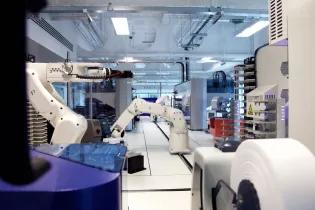An Edinburgh researcher has contributed to a Government Office for Science’s publication on how the power of Engineering Biology could be harnessed to tackle complex real-world problems.
Professor Louise Horsfall of the School of Biological Sciences was among a select group of UK researchers involved in producing the report.
Her work focuses on engineering microbes to extract and recycle key metals – which are often in limited supply or raise geopolitical issues – from old batteries, industrial catalysts and electronic wastes.
Forging a more environmentally friendly future for metal production would benefit areas such as the sustainable energy sector, which relies on rare metals for technologies including electric vehicle batteries and magnets in wind turbine generators, Horsfall says.
Government analysis
The new report highlights the breadth of engineering biology’s potential to drive economic growth and benefit areas such as healthcare, sustainability, agriculture and energy.
It provides a vision for how engineering biology could help solve enduring economic and societal challenges over the next 10 years and beyond.
The publication details how applying engineering principals to biological systems could help transform a range of sectors. This could include facilitating the production of green fuels and lab-grown blood, supporting more sustainable fashion and improving crop production.
University expertise
With more than 200 scientists working on aspects of Engineering Biology, the University has one of the largest groupings of researchers worldwide focused on this pioneering field.
The University is also home to state-of-the-art facilities including the Edinburgh Genome Foundry, which is the world’s largest automated DNA assembly platform.
Since 2007, the University has received more than £100m investment in Engineering Biology from UK Research and Innovation (UKRI). Edinburgh’s expertise in the area has also led to partnerships with major companies including Unilever, FUJIFILM Diosynth Biotechnologies and Lubrizol.
Professor Horsfall’s research has received long-term support from the Faraday Institution, the Engineering and Physical Sciences Research Council (EPSRC) and Biotechnology and Biological Sciences Research Council (BBSRC).


